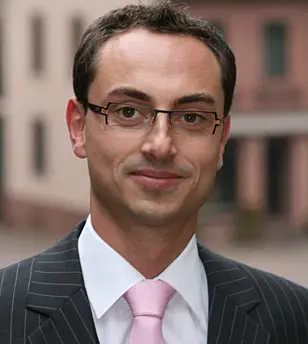As a Junior Research Group leader, Dr. Andreas Fischer will be able to establish his own research group and will have an annual budget of at least €250,000 at his disposal over the next five years. This will enable him to finance his own position plus at least three co-workers and the laboratory equipment.
“This award is a great acknowledgement of my work so far and an important milestone in my career. To be able to establish my own group at a leading research center such as DKFZ guarantees not only excellent conditions for my scientific projects but also marvelous
prospects for my personal future," said Andreas Fischer happily. Up to now, Dr. Fischer has led a working group in the field of “Vascular Biology" supported
jointly by the Medical Faculty Mannheim of Heidelberg University and the German Cancer Research Center (Deutsches Krebsforschungszentrum, DKFZ). Fischer is studying, among
other things, how blood vessels develop. He investigates molecular signals acting upon blood vessel cells called endothelial cells. Such signals determine where these cells will
sprout to form new small blood vessels, whether the new vessels will become veins or arteries and how the new blood vessels will mature. The sprouting of new blood vessels, or
angiogenesis, is of particular interest in cancer research: Without being connected to the supply paths of the bloodstream, a tumor could grow no bigger than the size of a pin head.
The molecular signals transmitted to endothelial cells are not only relevant in cancer: As Fischer was able to show in prior studies, they are also involved in the correct formation of
the anatomy of the heart. Disruptions affecting this signaling cascade also lead to brain vascular malformations.
Andreas Fischer has already been distinguished with several awards for his work: Only this year, he has been presented the Chica and Heinz Schaller Sponsorship Award comprising
research funds of 100,000 euros and the Dr. Hella Buehler Prize of 75,000 euros. Andreas Fischer (aged 34) studied medicine in Wuerzburg and Boston and earned an M.D.
in 2003. After his ‘Approbation’ as a medical doctor, he participated in a three-year postdoctoral training at the Biocenter of Wuerzburg University and joined DKFZ and Medical
Faculty Mannheim in 2007. He pursues his studies at DKFZ in the DKFZ-ZMBH Alliance, a strategic collaboration of DKFZ with the Center for Molecular Biology of Heidelberg University (Zentrum für Molekulare Biologie, ZMBH).
The new Helmholtz Junior Research Group will receive half of its funding from the Initiative and Networking Fund of Helmholtz Association and the other half from the German Cancer
Research Center. As a junior research group leader, Andreas Fischer will also be offered an option of a permanent position (tenure track), provided he will receive a positive expert
evaluation in four years time. This aspect makes these positions attractive for young researchers from research institutes worldwide.
The Junior Research Group Program also aims to enhance networking between Helmholtz Centers and partnering universities. The young researchers pursue research at a Helmholtz
Center and fulfill academic tasks at a partnering university at the same time so as to qualify also for a university career. Dr. Fischer will retain his affiliation to Medical Faculty Mannheim
of Heidelberg University and will be involved in teaching. The Helmholtz Association, of which DKFZ is a member, has made possible 151 Junior Research Groups by now.



